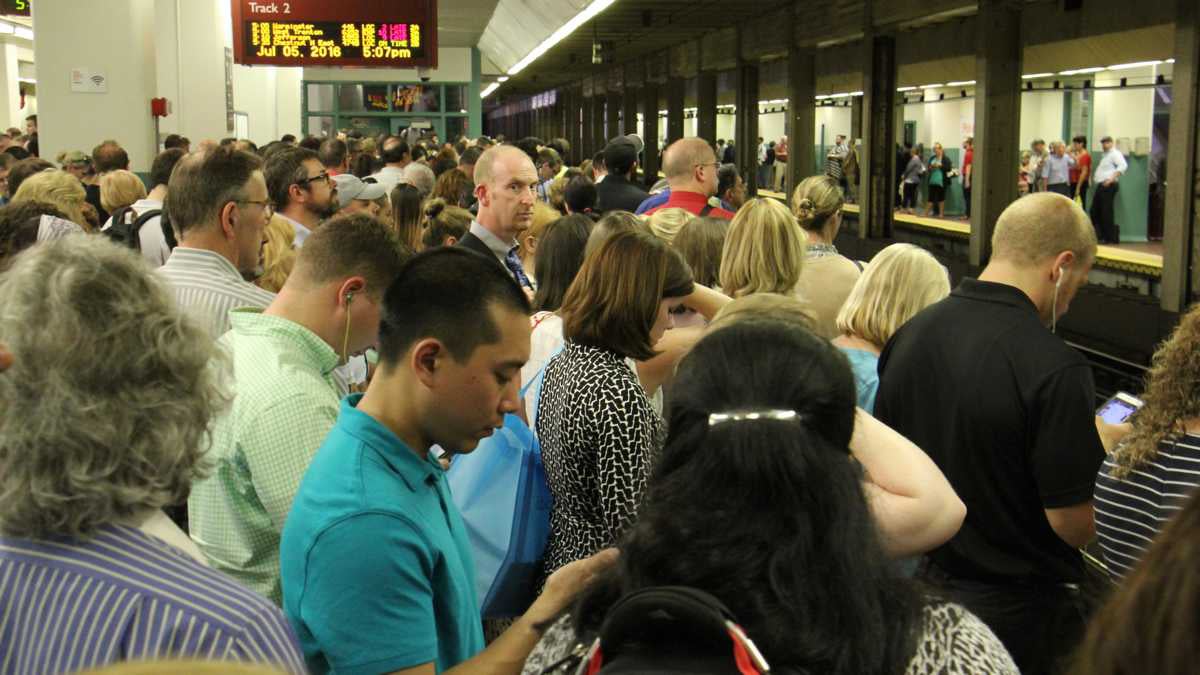In case you missed it: This week’s best reads from Pennsylvania cities

Regional rail passengers pack the platforms at SEPTA's Suburban Station in Philadelphia at rush hour. (Emma Lee/WHYY)
It’s hot out there, folks, but it’s not just your ice cream that’s having a meltdown.
Avoiding a budget meltdown
Last year’s extended budget impasse had a degree of morbid excitement around it. Just how long could Pennsylvania’s elected leaders delay passing a budget? Which side would crack first? But now that we’ve seen the side effects of Harrisburg digging in its heels — school funding, social services and credit ratings — no one is looking for a repeat show.
The deadline was June 30th, and the House and Senate have passed a spending bill that awaits the Governor’s signature. Wolf seems disinclined to sign the budget without a clear revenue plan to pay for that spending. He has until Monday night to veto the bill or it will pass into law without his signature.
A looming State Police meltdown
The Pennsylvania State Police may have a problem on its hands. The agency — which serves as the primary police force for half of the state’s municipalities — expects 2,000 troopers to reach retirement eligibility in the next three years. And the state has only allocated enough funds to train 180 troopers a year.
PSP is already short on troopers, even as more municipalities turn over policing responsibility to the state. The state has been funding the agency with money that should go towards highway repair; representatives from the Pennsylvania State Trooper Association say it’s time for PSP to get the funding it needs to remain functional.
SEPTA isn’t the only infrastructure meltdown to watch
SEPTAgeddon is a cute name for a not-so-cute issue. The Philadelphia-area transit authority has taken a third of it’s trains off the tracks for emergency repairs. The state’s largest public transit system is plagued with delays, cancelled trips and commuter headaches, with no end in sight.
As we’ve reported, the Philadelphia-area has the largest percentage of commuters traveling to work by public transportation. The city has permitted Uber to operate legally during this time, and is hoping to borrow trains from other systems.
Don’t feel too bad, Philly. Washington, D.C. commuters are having an even worse time. After an emergency 29-hour metro shutdown, the city is spending the next year upgrading trains and tracks after a series of underground fires and floods.
But as the Washington Post points out, the D.C. metro debacle is just a symptom of a larger problem: we’ve let our infrastructure decay. Pennsylvania has a higher percentage of structurally deficient bridges than any other state. Drive around downtown in any city and you’ll feel the pothole problem firsthand. Modernizing water infrastructure nationwide would cost more than $1 trillion over the next 25 years.
This isn’t a problem cities are ignoring. Rosabeth Moss Kanter, a Harvard Business School professor, visited cities around the country to see how they are reinventing and improving their existing infrastructure. In a national survey, the mayors of major cities in the U.S. agreed that infrastructure improvement is a top priority — but they are held back by lack of federal and state iniatitive.
WHYY is your source for fact-based, in-depth journalism and information. As a nonprofit organization, we rely on financial support from readers like you. Please give today.


